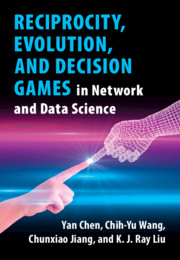Book contents
- Frontmatter
- Contents
- Preface
- 1 Basic Game Theory
- Part I Indirect Reciprocity
- 2 Indirect Reciprocity Game in Cognitive Networks
- 3 Indirect Reciprocity Game for Dynamic Channel Access
- 4 Multiuser Indirect Reciprocity Game for Cooperative Communications
- 5 Indirect Reciprocity Data Fusion Game and Application to Cooperative Spectrum Sensing
- Part II Evolutionary Games
- Part III Sequential Decision-Making
- Index
3 - Indirect Reciprocity Game for Dynamic Channel Access
from Part I - Indirect Reciprocity
Published online by Cambridge University Press: 01 July 2021
- Frontmatter
- Contents
- Preface
- 1 Basic Game Theory
- Part I Indirect Reciprocity
- 2 Indirect Reciprocity Game in Cognitive Networks
- 3 Indirect Reciprocity Game for Dynamic Channel Access
- 4 Multiuser Indirect Reciprocity Game for Cooperative Communications
- 5 Indirect Reciprocity Data Fusion Game and Application to Cooperative Spectrum Sensing
- Part II Evolutionary Games
- Part III Sequential Decision-Making
- Index
Summary
Cooperation is a promising approach to simultaneously achieving efficient spectrum resource use and improving the quality of service of primary users in dynamic spectrum access networks. However, due to their selfish nature, how to stimulate secondary users to play cooperatively is an important issue. In this chapter, we discuss a reputation-based spectrum access framework where the cooperation stimulation problem is modeled as an indirect reciprocity game. In this game, secondary users choose how to help primary users relay information and gain reputation, based on which they can access a certain amount of vacant licensed channels in the future. By formulating a secondary user's decision-making as a Markov decision process, the optimal action rule can be obtained, according to which the secondary user will use maximal power to help the primary user relay data and thus greatly improve the primary user's quality of service as well as the spectrum utilization efficiency. Moreover, the uniqueness of the stationary reputation distribution is proved, and the conditions under which the optimal action rule is evolutionarily stable are theoretically derived.
Keywords
- Type
- Chapter
- Information
- Publisher: Cambridge University PressPrint publication year: 2021

